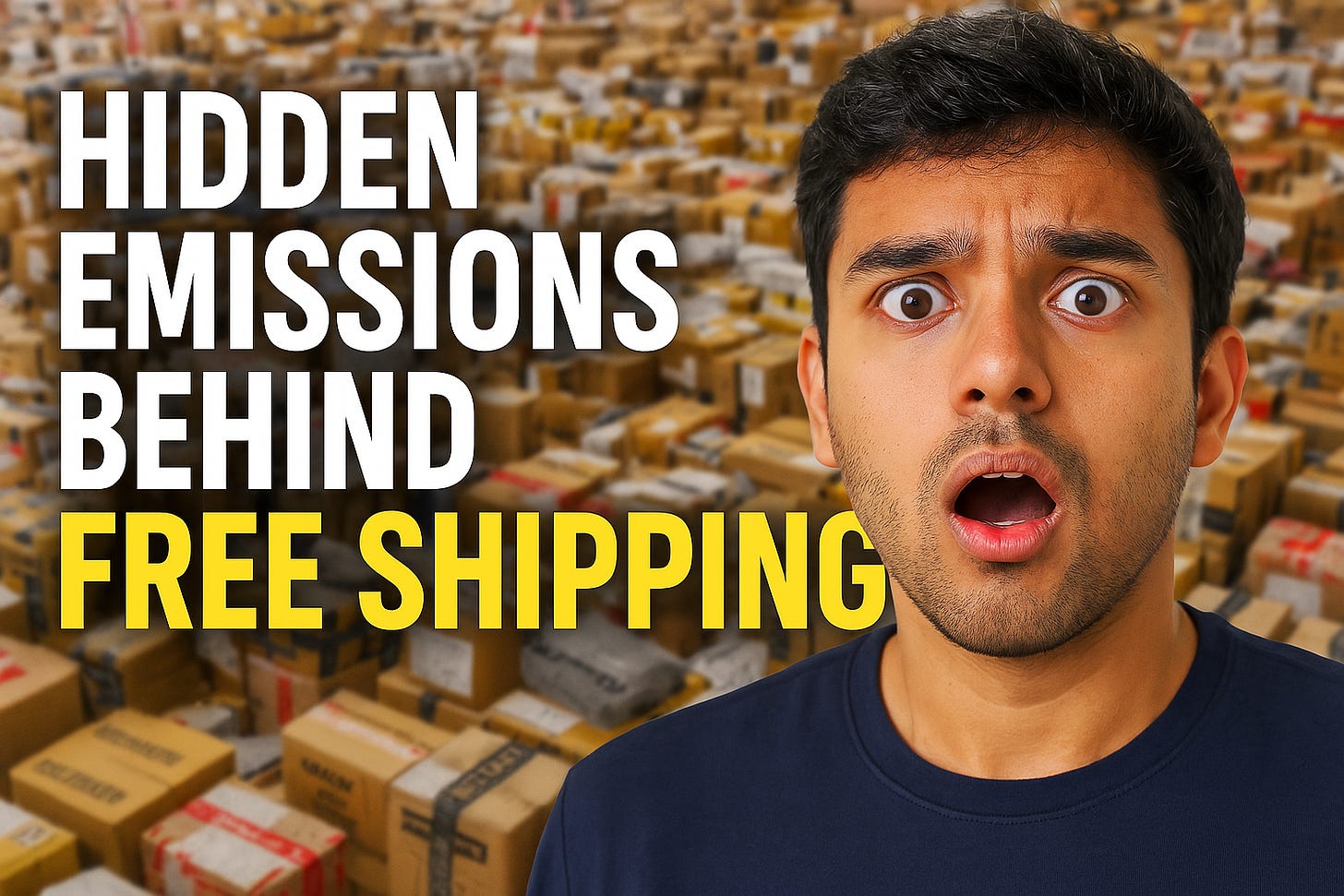The Hidden Emissions Behind Your Free Shipping
Why convenience is costing the planet — one delivery at a time.
We love convenience.
🛵 10-minute grocery delivery.
📦 Next-day Amazon Prime orders.
🔁 Buy-now-return-anytime clothing.
It’s fast.
It’s frictionless.
And it’s quietly becoming one of the fastest-growing sources of carbon emissions and packaging waste in India.
The Illusion of “Free”
There’s no such thing as free shipping.
Only delayed consequences.
Every time you hit Buy Now, it sets off a chain reaction:
A half-empty two-wheeler or delivery van races across your city
Excess packaging is used to ensure "safe & fast" delivery
Single-item trips multiply across localities
Reverse logistics burn double the emissions
Returns often get tossed, not resold
Your 10-minute delivery?
That’s 1 trip, 1 plastic bag, 1 cardboard box, 1 invoice, and 1 carbon footprint…
for a packet of chips.
Now multiply that by 4 crore deliveries a day in India.
And you see the scale of the issue.
India’s Hyperlocal Emissions Boom
India’s quick commerce sector — Blinkit, Zepto, Swiggy Instamart — is expected to grow 10x by 2025.
But no one talks about what’s left behind:
🔋 Gig workers rushing through traffic, burning more fuel for single orders
📦 Exploding demand for throwaway packaging — sachets, shrink-wraps, plastic trays
🗑️ Millions of deliveries that bypass waste segregation entirely
🚛 Reverse logistics that are rarely optimized for emissions or returns
Convenience has outpaced sustainability.
And policy hasn’t caught up yet.
What Happens to Returns?
Most returns don’t go back on the shelf.
They’re often:
Discarded
Incinerated
Or shipped again to secondary markets with little accountability
In the case of fast fashion or FMCG items, many aren’t reused — they’re just repackaged as waste.
So What Can We Do?
This isn’t about blaming consumers.
It’s about making better-informed choices.
Here’s where we start:
✅ Delay the delivery – choose the 2-day option instead of 2-hour
✅ Bundle your purchases – order once a week, not 5 times a week
✅ Say no to urgency marketing – “only 5 left” is often a lie
✅ Support local – walk to the store when you can
✅ Push for reusable packaging options
✅ Support brands with transparent return and disposal practices
The Circular Fix
Sustainability isn’t about saying no to convenience forever.
It’s about designing convenience better.
Imagine if:
♻️ Groceries came in reusable crates that got picked up the next day
📦 Your ecommerce packaging was bio-returnable or deposit-based
💬 You got to see the carbon footprint next to each shipping option
🏙️ Brands collaborated with cities for zero-waste zones and reverse collection hubs
This is not sci-fi.
It’s very doable.
But only if we acknowledge the cost of what we call “free.”
Final Thought
In India, we’ve mastered jugaad.
We’ve built the infrastructure for speed.
Now, we need to build the mindset for sustainability.
Your 10-minute delivery is not just a business model.
It’s a carbon model.
Free shipping isn’t free.
It’s just prepaid by the planet.
🟡 Forward this to a friend who orders daily.
♻️ Or tag a brand that should rethink its delivery model.
Let’s keep talking about the systems we’ve normalized — and how we can redesign them to be truly circular.



